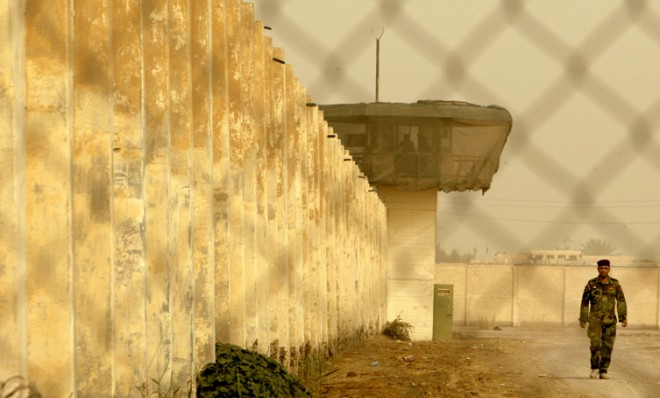Iraq's spectacular Abu Ghraib prison break: Is al Qaeda back?
As many as 500 prisoners were freed, including hardcore militants, a victory for al Qaeda–linked groups

A free daily email with the biggest news stories of the day – and the best features from TheWeek.com
You are now subscribed
Your newsletter sign-up was successful
On Tuesday, al Qaeda's affiliate in Iraq claimed responsibility for violent attacks on the high-security prisons of Abu Ghraib and Taji, which, according to Iraqi officials, resulted in up to 500 prisoners escaping — including convicted al Qaeda militants.
The deadly raids involved a blitzkrieg of coordinated attacks utilizing rocket-propelled grenades, mortars, and suicide bombers. Iraqi officials put the death toll at 56, which included security forces, prisoners, and militants, while al Qaeda claimed that 120 government forces were killed.
The worst attack happened at Abu Ghraib, the same site where the U.S. military was accused of prisoner abuses in 2003. The fighting started on Sunday night, as militants drove cars packed with explosives into the gates of the compound, and then fired on security forces and military reinforcements sent from Baghdad. The battle lasted through Monday morning, when military helicopters arrived on the scene to back up government soldiers.
The Week
Escape your echo chamber. Get the facts behind the news, plus analysis from multiple perspectives.

Sign up for The Week's Free Newsletters
From our morning news briefing to a weekly Good News Newsletter, get the best of The Week delivered directly to your inbox.
From our morning news briefing to a weekly Good News Newsletter, get the best of The Week delivered directly to your inbox.
Iraqi and U.S. officials are now grappling with the implications of such a brazen attack. Dan Murphy of The Christian Science Monitor called it a "stunning symbolic defeat" for Iraqi Prime Minister Nouri al-Maliki and his majority Shiite government, noting that the prison held special significance to Sunni militants:
Abu Ghraib was long ago returned to Iraq's government, but succeeding Iraqi governments have made torture far more widespread and routine than it was when the U.S. was running the country. While the worst abuses under Maliki's rule have taken place in secret prisons co-located with Iraqi Army bases and Interior Ministry facilities, Abu Ghraib remains a symbol of central government abuse. [The Christian Science Monitor]
The attack is also a sign that Iraq's worsening sectarian violence isn't likely to end soon. In May, a wave of attacks in Sunni-majority areas of Baghdad caused some observers to wonder whether Iraq was returning to the violence of 2006, when the country was engulfed in what amounted to a bloody civil war. The violence has only gotten worse since May; more than 700 people were killed in July, making it the country's deadliest month since 2008.
Al Qaeda's branch in Iraq could be inspired by the fighting in neighboring Syria, where Sunni fighters, most notably the al Qaeda-linked Al Nusra Front, are competing for influence, against the backdrop of a larger struggle against the Alawite regime of President Bashar al-Assad.
"They've got the wind at their backs from the Syrian rebellion," Kenneth Katzman, a Congressional Research Service analyst, told TIME. "Their goal is to destabilize and bring down the Maliki government, and they think igniting sectarian conflict might accomplish that."
A free daily email with the biggest news stories of the day – and the best features from TheWeek.com
Charles Lister, a member of London's IHS Jane's defense consultancy, agreed.
"There's no underestimating the boost to morale," he told The Washington Post. "The fact that the Islamic State [an al Qaeda affiliate] has managed to secure territory of its own in northern Syria all adds to a gradual trend of increasing confidence and strength of al Qaeda in Iraq and in Syria."
As al Qaeda gains strength in Iraq, some officials are regretting asking U.S. military forces to leave, noted TIME's Michael Crowley, who added that it's probably too late to hope for American intervention:
But while it's possible the U.S. will offer help at the margins, Iraqis shouldn't expect an American cavalry. Leaving Iraq is one of Barack Obama's proudest accomplishments, and the president clearly has no desire to undo it — possibly even at the cost of seeing Iraq slip back into chaos. [TIME]
Meanwhile, the Pentagon and Congress are trying to decide how to best arm rebels in Syria. The news that experienced al Qaeda operatives have escaped Abu Ghraib and could be headed across the border doesn't make their decision-making process any easier.
Keith Wagstaff is a staff writer at TheWeek.com covering politics and current events. He has previously written for such publications as TIME, Details, VICE, and the Village Voice.